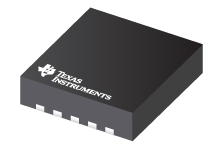Datasheet Texas Instruments TPS61201DRCT — Ficha de datos
| Fabricante | Texas Instruments |
| Serie | TPS61201 |
| Numero de parte | TPS61201DRCT |

Entrada de 0.3V, convertidor de refuerzo de voltaje de salida de 3.3V con interruptores de 1.3A y 'modo inactivo' en un 3x3 QFN 10-VSON -40 a 85
Hojas de datos
TPS6120x Low Input Voltage Synchronous Boost Converter With 1.3-A Switches datasheet
PDF, 1.4 Mb, Revisión: E, Archivo publicado: dic 24, 2014
Extracto del documento
Precios
Estado
| Estado del ciclo de vida | Activo (Recomendado para nuevos diseños) |
| Disponibilidad de muestra del fabricante | Sí |
Embalaje
| Pin | 10 |
| Package Type | DRC |
| Industry STD Term | VSON |
| JEDEC Code | S-PDSO-N |
| Package QTY | 250 |
| Carrier | SMALL T&R |
| Device Marking | BRS |
| Width (mm) | 3 |
| Length (mm) | 3 |
| Thickness (mm) | .9 |
| Pitch (mm) | .5 |
| Max Height (mm) | 1 |
| Mechanical Data | Descargar |
Paramétricos
| Duty Cycle(Max) | 95 % |
| Iq(Typ) | 0.05 mA |
| Operating Temperature Range | -40 to 85 C |
| Package Group | VSON |
| Rating | Catalog |
| Regulated Outputs | 1 |
| Special Features | Enable,Light Load Efficiency,Load Disconnect,Power Good,UVLO Adjustable |
| Switch Current Limit(Min) | 1.2 A |
| Switch Current Limit(Typ) | 1.35 A |
| Switching Frequency(Max) | 1650 kHz |
| Switching Frequency(Min) | 1250 kHz |
| Type | Converter |
| Vin(Max) | 5.5 V |
| Vin(Min) | 0.3 V |
| Vout(Max) | 3.3 V |
| Vout(Min) | 3.3 V |
Plan ecológico
| RoHS | Obediente |
Kits de diseño y Módulos de evaluación
- Evaluation Modules & Boards: TPS61201EVM-179
TPS61201EVM-179 Evaluation Module
Estado del ciclo de vida: Activo (Recomendado para nuevos diseños)
Notas de aplicación
- Five Steps to a Good PCB Layout of the Boost ConverterPDF, 701 Kb, Archivo publicado: mayo 3, 2016
- Minimizing Ringing at the Switch Node of a Boost ConverterPDF, 201 Kb, Archivo publicado: sept 15, 2006
The application report explains how to use proper board layout and/or a snubber to reduce high-frequency ringing at the switch node of a boost converter. - Basic Calculation of a Boost Converter's Power Stage (Rev. C)PDF, 186 Kb, Revisión: C, Archivo publicado: enero 8, 2014
This application note gives the equations to calculate the power stage of a boost converter built with an IC with integrated switch and operating in continuous conduction mode. It is not intended to give details on the functionality of a boost converter (see Reference 1) or how to compensate a converter. See the references at the end of this document if more detail is needed. - Optimizing Transient Response of Internally Compensated DC-DC Converters (Rev. A)PDF, 1.1 Mb, Revisión: A, Archivo publicado: mayo 11, 2015
- Extending the Soft Start Time Without a Soft Start Pin (Rev. B)PDF, 387 Kb, Revisión: B, Archivo publicado: jun 15, 2017
- QFN and SON PCB Attachment (Rev. B)PDF, 821 Kb, Revisión: B, Archivo publicado: agosto 24, 2018
- IQ: What it is what it isn’t and how to use itPDF, 198 Kb, Archivo publicado: jun 17, 2011
- Performing Accurate PFM Mode Efficiency Measurements (Rev. A)PDF, 418 Kb, Revisión: A, Archivo publicado: dic 11, 2018
When performing measurements on DC-DC converters using pulse frequency modulation(PFM)or any power save mode proper care must be taken to ensure that the measurements are accurate. An accurate PFM mode efficiency measurement is critical for systems which require high efficiency at low loads such as in smart home systems tablets wearables and metering.
Linea modelo
Serie: TPS61201 (4)
- TPS61201DRCR TPS61201DRCRG4 TPS61201DRCT TPS61201DRCTG4
Clasificación del fabricante
- Semiconductors > Power Management > Non-isolated DC/DC Switching Regulator > Step-Up (Boost) > Boost Converter (Integrated Switch)